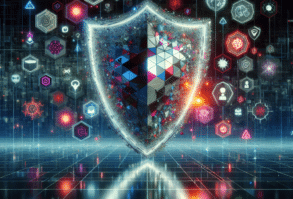In today’s digital age, cybersecurity has become a pressing concern for individuals and organizations alike. With the increasing number of cyber threats, it is crucial for individuals to stay vigilant and take proactive measures to protect their online presence. This article aims to provide valuable insights and daily tips for end user security, empowering users with the knowledge they need to safeguard their digital lives. From understanding the importance of cybersecurity education to mastering daily practices that enhance online safety, this article will equip readers with the necessary tools to navigate the ever-evolving landscape of cybersecurity. Whether you are a college student, a working professional, or simply someone who wants to stay cyber safe, this article is designed to help you navigate the digital world with confidence. So, let’s dive in and discover how you can enhance your cybersecurity and protect yourself from potential threats.
- 1. "Stay Cyber Safe: Daily Tips for End User Security"
- 2. "Empowering Users: The Importance of Cybersecurity Education"
- 3. "Mastering Cybersecurity: Daily Practices to Safeguard Your Digital Life"
1. "Stay Cyber Safe: Daily Tips for End User Security"
Stay Cyber Safe: Daily Tips for End User Security
In today’s digital age, cybersecurity has become more important than ever before. With cyber threats constantly evolving and becoming more sophisticated, it is crucial for individuals to stay vigilant and proactive in protecting their personal information and digital assets. Whether you are a student, professional, or simply someone who uses the internet regularly, following these daily tips for end user security can help keep you safe online.
1. Keep your devices updated: One of the easiest ways to enhance your cybersecurity is by regularly updating your devices’ operating systems and applications. These updates often include security patches and bug fixes that address vulnerabilities hackers could exploit. Set your devices to automatically update to ensure you’re always running the latest, most secure versions.
2. Use strong and unique passwords: It may sound cliché, but using strong and unique passwords is still one of the most effective ways to protect your online accounts. Avoid using common passwords or personal information in your passwords, and consider using a password manager to generate and store complex passwords for each of your accounts. Additionally, enable two-factor authentication whenever possible for an extra layer of security.
3. Be cautious of phishing attempts: Phishing is a common tactic used by cybercriminals to trick individuals into revealing sensitive information. Be wary of suspicious emails, messages, or phone calls asking for personal information or urging you to click on a link. Always verify the source before providing any sensitive data or clicking on any unfamiliar links. Remember, legitimate organizations will never ask for your password or sensitive information via email.
4. Secure your home network: Your home Wi-Fi network can be a vulnerable entry point for hackers. To ensure its security, change the default network name and password, enable WPA2 encryption, and regularly update your router’s firmware. Also, consider setting up a guest network for visitors to prevent unauthorized access to your main network.
5. Backup your data regularly: Data loss can occur due to various reasons, including cyber attacks, hardware failure, or accidental deletion. Regularly backing up your important files and data helps safeguard your information and minimizes the impact of any potential data loss. Use external hard drives, cloud storage services, or automated backup solutions to ensure your data is always protected.
6. Stay informed about cybersecurity threats: Cybersecurity threats are constantly evolving, so staying informed is crucial. Keep up with the latest news and trends in cybersecurity by following reputable sources, subscribing to cybersecurity blogs, or attending webinars and conferences. Educate yourself about different types of cyber threats and best practices for protecting yourself online.
By implementing these daily tips for end user security, you can significantly reduce the risk of falling victim to cyber attacks. Remember, cybersecurity is a shared responsibility, and investing in cybersecurity education and awareness is essential to staying safe online. Stay vigilant, stay informed, and stay cyber safe.
2. "Empowering Users: The Importance of Cybersecurity Education"
In today’s digital age, cybersecurity has become a critical concern for individuals and organizations alike. With cyber threats becoming increasingly sophisticated, it is essential for users to be empowered with the knowledge and skills to protect themselves and their data. This is where cybersecurity education plays a crucial role.
Cybersecurity education aims to equip users with the necessary understanding of the threats they face and the measures they can take to mitigate them. It goes beyond just installing antivirus software or using strong passwords; it involves creating a culture of security-conscious individuals who actively contribute to safeguarding their digital lives.
One of the primary benefits of cybersecurity education is its ability to enhance end user security. Many cyber attacks exploit human vulnerabilities rather than technical weaknesses, making users the weakest link in the security chain. By providing education and awareness, users can become more vigilant and develop a proactive mindset towards cybersecurity. They learn to recognize suspicious emails, avoid clicking on malicious links, and adopt safe online practices.
Furthermore, cybersecurity education helps users understand the potential consequences of their actions or inactions. They become aware of the risks associated with sharing personal information online, falling for phishing scams, or using unsecured Wi-Fi networks. Armed with this knowledge, users are more likely to make informed decisions and take necessary precautions to protect themselves against cyber threats.
Another aspect of cybersecurity education is promoting responsible digital citizenship. Users are encouraged to understand and respect the privacy and security of others. They learn about ethical online behavior, such as not engaging in cyberbullying, not sharing others’ personal information without consent, and respecting intellectual property rights. By fostering a sense of responsibility and accountability, cybersecurity education contributes to creating a safer and more ethical digital environment.
In addition to empowering individual users, cybersecurity education also benefits organizations. Employees who receive proper training and education are less likely to fall victim to social engineering attacks or inadvertently compromise sensitive data. This reduces the risk of data breaches and financial losses for businesses. By investing in cybersecurity education, organizations can build a strong security culture and enhance their overall resilience against cyber threats.
To ensure the effectiveness of cybersecurity education, it should be an ongoing process. The threat landscape is constantly evolving, and new vulnerabilities emerge regularly. It is crucial to provide regular updates and training sessions to keep users informed about the latest threats and best practices. Additionally, cybersecurity education should be tailored to suit different user groups, taking into account their roles, responsibilities, and level of technical expertise.
In conclusion, empowering users through cybersecurity education is of paramount importance in today’s digital world. By providing individuals with the knowledge and skills to protect themselves and their data, we can create a more secure online environment. From enhancing end user security to fostering responsible digital citizenship, cybersecurity education plays a vital role in mitigating the risks posed by cyber threats. It is a proactive approach that enables individuals and organizations to stay one step ahead of cybercriminals and safeguard their digital lives.
3. "Mastering Cybersecurity: Daily Practices to Safeguard Your Digital Life"
Mastering Cybersecurity: Daily Practices to Safeguard Your Digital Life
In today’s digital age, cybersecurity is an ever-present concern. With cyber threats becoming increasingly sophisticated, it is essential for individuals to prioritize the security of their digital lives. By adopting a few simple daily practices, you can significantly enhance your cybersecurity and protect yourself from potential risks.
1. Stay Updated on Security News and Threats
One of the most effective ways to safeguard your digital life is to stay informed about the latest security news and threats. Cybercriminals constantly evolve their tactics, and by staying updated, you can be better prepared to recognize and counter potential attacks. Follow reputable cybersecurity blogs, subscribe to relevant newsletters, and stay connected with the cybersecurity community. This will enable you to stay ahead of the curve and make informed decisions to protect your digital assets.
2. Use Strong and Unique Passwords
Passwords serve as the first line of defense against unauthorized access to your accounts. Using strong and unique passwords is paramount to maintaining your cybersecurity. Avoid common passwords, such as "password123" or your birthdate, as they are easily guessable. Instead, opt for complex passwords that incorporate a combination of upper and lowercase letters, numbers, and special characters. Furthermore, use a different password for each online account to prevent a single breach from compromising multiple accounts.
3. Employ Two-Factor Authentication
Two-factor authentication (2FA) adds an extra layer of security to your accounts by requiring an additional verification step after entering your password. This typically involves a unique code sent to your mobile device or generated by an authentication app. Enabling 2FA significantly reduces the risk of unauthorized access, even if your password is compromised. Whenever possible, enable this feature on your online accounts to bolster your cybersecurity.
4. Be Wary of Phishing Attempts
Phishing attacks are a common tactic used by cybercriminals to trick individuals into revealing sensitive information, such as login credentials or financial details. Be cautious when clicking on links or opening attachments in emails, especially if they are from unknown sources or seem suspicious. Verify the legitimacy of the sender before providing any personal information or clicking on any links. Keep in mind that reputable organizations will never ask for sensitive information via email.
5. Regularly Update Software and Operating Systems
Software and operating system updates often contain crucial security patches that address vulnerabilities discovered by developers. It is vital to regularly update your software and operating systems to ensure you have the latest security enhancements. Enable automatic updates whenever possible, as this will save you the time and effort of manually checking for updates. By keeping your software up to date, you minimize the risk of falling victim to known security vulnerabilities.
6. Backup Your Data Regularly
Data loss can occur due to various reasons, including cyberattacks, hardware failures, or accidental deletions. Regularly backing up your data is an essential practice to safeguard your digital life. Use reliable backup solutions, such as cloud storage or external hard drives, to ensure your important files are securely stored. By having multiple copies of your data, you can quickly recover in the event of data loss or a ransomware attack.
Conclusion
Cybersecurity is a crucial aspect of our digital lives, and it is essential to adopt daily practices that prioritize our online security. By staying informed, using strong passwords, enabling two-factor authentication, being cautious of phishing attempts, updating software regularly, and backing up our data, we can significantly enhance our cybersecurity. End user security should be a priority for everyone, and continuous cybersecurity education is key to staying one step ahead of cyber threats. Remember, mastering cybersecurity is an ongoing process, and by implementing these daily practices, you can protect yourself and your digital life.
In conclusion, staying cyber safe is a crucial aspect of our daily lives in this digital age. With the ever-evolving threats and vulnerabilities, it is imperative that we prioritize end user security and empower ourselves with cybersecurity education. By following the daily tips and practices outlined in this article, we can take proactive steps to safeguard our digital lives.
Cybersecurity is not just the responsibility of IT professionals or organizations; it starts with each and every one of us. We must be vigilant and aware of the potential dangers lurking online, and continuously educate ourselves on the best practices to mitigate these risks. The importance of cybersecurity education cannot be overstated, as it equips us with the knowledge and skills needed to navigate the digital landscape safely.
From regularly updating our software and devices to practicing strong password hygiene, we have the power to fortify our digital defenses. By incorporating these daily practices into our routine, we can minimize the likelihood of falling victim to cyberattacks and protect our sensitive information from falling into the wrong hands.
As technology continues to advance, so do the tactics employed by cybercriminals. It is essential that we stay informed and adapt our cybersecurity measures accordingly. Through ongoing education and awareness, we can stay one step ahead of potential threats and ensure a safer online experience for ourselves and our communities.
In conclusion, cybersecurity should not be taken lightly. By following the daily tips for end user security and investing in cybersecurity education, we can build a strong foundation to protect our digital lives. Let us embrace the responsibility and empower ourselves to be the first line of defense against cyber threats. Together, we can create a safer and more secure digital world.






